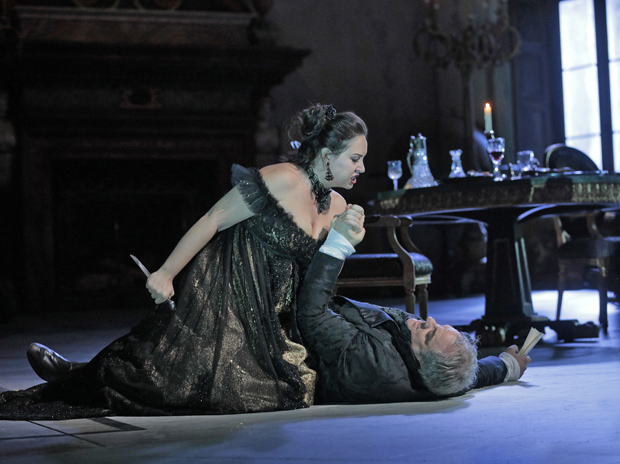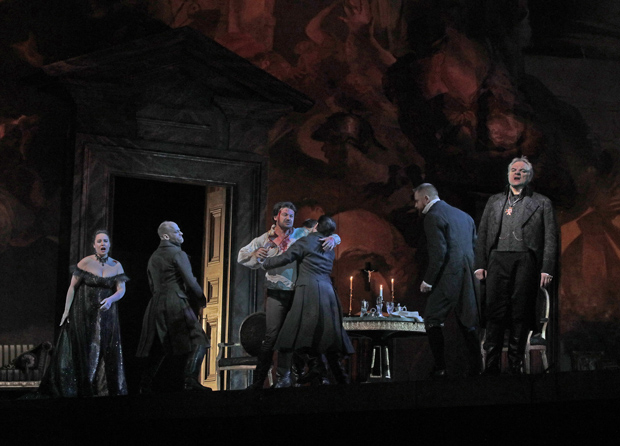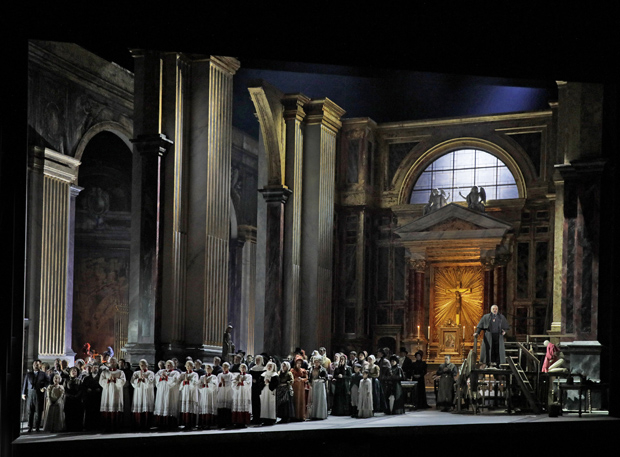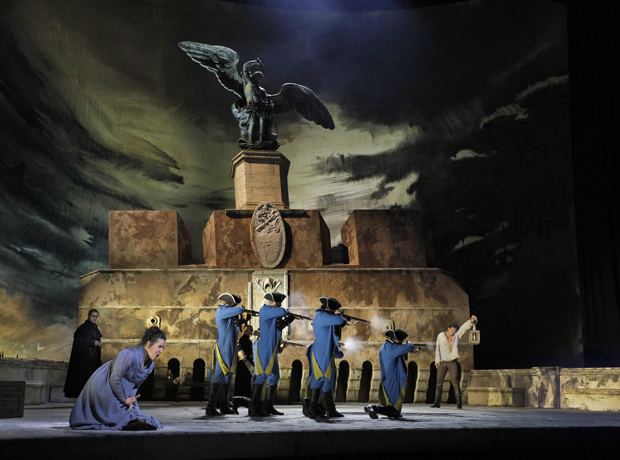Tosca

(© KenHoward/MetropolitanOpera)
The curtain for the Metropolitan Opera's new production of Giacomo Puccini’s Tosca is emblazed with the image of an avenging angel. Is it the archangel Michael, or is it Tosca herself, wielding deadly steel to cut down her abusers? Director David McVicar forces us to ask such questions about this staple of the opera repertoire with a production that looks traditional, but feels completely of the moment. That would be an impressive achievement in any opera, but it is especially remarkable for one with such a troubled history.
The saga of Tosca at the Met could be the basis of an opera itself: The last new production opened in 2009 to a chorus of boos from an audience displeased with director Luc Bondy's stark and sexually explicit reimagining. By commissioning a new production just eight years later, Met artistic director Peter Gelb seemed to be extending an olive branch to those traditionalists. Unfortunately, the leaves kept falling off, threatening to turn this branch into a twig: In the last year, all three original leads withdrew, as did two conductors (longtime Met conductor James Levine was suspended just last month following a series of sexual abuse allegations). While none of them were originally envisioned for this production, this new cast led by conductor Emmanuel Villaume brings an urgent vitality to a story that is all surging blood and dripping sweat.

(© KenHoward/MetropolitanOpera)
Set in June of 1800, as Napoleon's armies assault northern Italy, Tosca opens with the breathless entrance of Cesare Angelotti (Christian Zaremba) into the Church of Sant'Andrea della Valle. The former consul of the short-lived Roman republic that was established the last time Napoleon invaded, Angelotti has just escaped from the prison where he was being held by the villainous chief of police, Baron Scarpia (Željko Lučić). He beseeches the aid of artist Mario Cavaradossi (Vittorio Grigolo), who is working on a painting of Mary Magdalene. Cavaradossi agrees to help him, but his jealous girlfriend, the opera singer Floria Tosca (Sonya Yoncheva), hears them whispering in the sanctuary and assumes that he is with another woman. Cavaradossi swears that he is faithful, but Tosca's trust is put to the test when Scarpia tries to use her suspicion to turn her away from the arms of her revolutionary lover — and into his own.
Lučić's stony performance masks Scarpia's unbridled lust, not so much for sex, but for power. The more Tosca voices her disgust for him, the more he seems to want her, giving us a sense of the police chief as a Roman Harvey Weinstein, enamored with his own ability to exert godlike control over others. Of course, the gods never appreciate their prerogative being usurped by mere mortals, and Scarpia is duly punished for his hubris.
Exhibiting far more humility, Yoncheva and Grigolo make a daring assault on the Pantheon of opera gods with this exhilarating joint debut (neither performer has ever sung these roles at another venue). Heat radiates between them during their duets. Grigolo's Cavaradossi smothers Tosca in kisses, his teeming passion occasionally exploding into powerfully resonant top notes. His second act declaration of "Vittoria" (a feminization of the performer's own first name) makes us wonder if Grigolo is celebrating his own conquest, rather than Napoleon's.
Yoncheva's Tosca is the greatest victory here, however. In a highly realistic performance, she is simultaneously commanding and vulnerable, especially during a revelatory "Vissi d'arte," in which she contemplates her impossible situation: Scarpia will spare Cavaradossi's life only if she sleeps with him. She nearly bursts into tears on the high B, but regains composure as she steps back to A and then G. She will not give him the satisfaction of seeing her break down. It's a feeling to which many women can doubtlessly relate.
Playing a vampiric Spoletta, Brenton Ryan leads an entourage of Scarpia's enablers, men who are fully aware of what their boss is up to as they are onstage while he is doing it. Considering everything we've learned recently about the way organizations facilitate the misbehavior of the powerful men who lead them, this too feels very real.

(© KenHoward/MetropolitanOpera)
The story greatly benefits from an exceptional rendition of the score. Villaume conducts a perfectly balanced and ideally paced musical performance, allowing Puccini's inspired motifs and inventive use of unconventional sounds to weave effortlessly throughout, accenting the stage action without drowning the vocals.
As he proved earlier this season with Norma, McVicar excels at grounding highly romantic stories in genuine human emotions. Similarly, John Macfarlane's sets and costumes are not just handsome window dressing. His three-part set is full of commentary that deepens the story. For instance, an entire wall of Scarpia's apartment is a mural depicting the rape of the Sabine women, a foundational event in the history of Rome that reminds us that men like Scarpia have long dominated the eternal city, and will continue to do so long after the events here.

(© KenHoward/MetropolitanOpera)
This is a first-rate production of Tosca that manages to be both timely and universal, two adjectives we don't often associate with a form as seemingly rarified and calcified as opera. With his unpretentious blend of tradition and innovation, McVicar is pushing audiences to reevaluate old assumptions.










